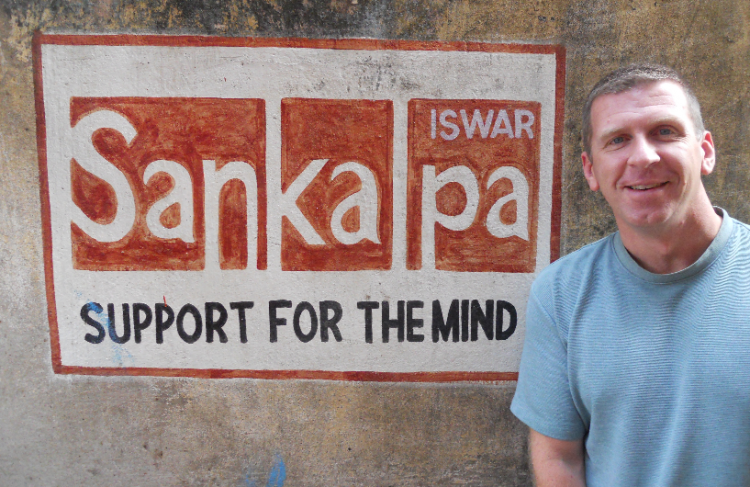Slumdog Social Worker
by John Gontkof, ’95, ’01 M.S
Imagine, if you could, waking up one day and not knowing where you were, or more importantly, who you were? Maybe you remember your name, but have no idea where you came from or how you got to the place you were found? After being in this state for a period of time, you may feel a loss of dignity, self and even part of the larger society that keeps moving all around you. Without any identification, it is hard to get help and in a sense you are no longer regarded as a citizen in your own country.
This may seem like an improbable scenario for most of us to comprehend. However, it is a reality for many people around the world, including those in the large city of Kolkata (Calcutta), India. I never thought my IT job with IBM would give me the opportunity to perform service work around the globe. However, in September 2010, I had the opportunity through IBM’s Corporate Service Corps to travel to Kolkata and work with a small, but dedicated NGO (Non-Governmental Organization or Non-Profit) to help these mentally ill homeless. It was an amazing opportunity and one I will never forget.
The IBM Corporate Service Corps (CSC) is a highly competitive leadership development program that sends IBM employees to cities and countries around the world in a private-sector version of the Peace Corps. To date over 1,000 IBM employees from more than 50 countries have participated in this philanthropic initiative, which enables them to share their business expertise with not-for-profit organizations, entrepreneurs, small business owners and governmental agencies in markets globally.
CSC was launched in 2008 as a means to develop IBM leaders who have the skills needed for a globally integrated enterprise, while also serving
the communities in which IBM employees live and work. Participants are among IBM’s top performers who spend three months preparing for their four-week assignments. In 2010, I was proud to be one of 500 participants selected out of 5,000 applicants worldwide. Being assigned to a 10-person team, we were the eighth team to India and the first to Kolkata.
My team consisted of IBMers from seven different countries including the United States,Argentina, Australia, Canada, France, Germany and the Netherlands. Prior to being assigned to the team, none of our paths had crossed before, but by the end of our month-long assignment in India, we were great friends.
Based on our résumés, which we provided during the application process, we were divided into two-person teams and assigned to different NGOs.
My teammate was Minke from the Netherlands. She was a change manager at IBM. With my position as an IT specialist focused on Uni x/AIX and Storage, we balanced each other well between the technical and non-technical requirements.

We were assigned to an NGO called Iswar Sankalpa (www.isankalpa.org) whose mission is to help the mentally ill homeless on the streets of Kolkata. With the overpopulation of Kolkata and the large number of homeless, this is no easy task, but the small and dedicated team we worked with was relentless in their pursuits. Iswar Sankalpa works very hard to help the mental state of these people. It offers the women a place to spend the night or many nights, if they are willing, while the team tries to locate their families so they may go home. The men can go to a day shelter located next to a local police station. Iswar Sankalpa doesn’t force anyone to do anything they don’t want to do. They spend weeks and months visiting the patients and offer them choices of going to the shelter, or letting the doctor examine them, even where they live on the streets. In the shelter, they participate in fun group therapy sessions as well as make greeting cards and paper bags among other things; anything to stay busy and help jog their memory to locate their family and find their way home.
After only the second day of being in India, Minke and I found ourselves walking along the slums of the Sealdah Railway Station with a volunteer doctor and two minimally paid social workers. We visited and treated homeless people who were identified to have schizophrenia, provided them food, and tried to coax them to go to the shelter. For some, being taken to a shelter is akin to
losing their freedom, and they would prefer to stay where they feel most comfortable.
Our requirements for Iswar Sankalpa were two-fold: to create an online database system through which the social workers could track a patient’s progress over time, and to create a five-year strategic plan for the organization. Within the four short weeks, Minke and I were able to accomplish both tasks, and I continue to provide any technical support I can for this worthwhile cause. To date, Iswar Sankalpa has found families and repatriated over 60 people from the streets of Kolkata. Being immersed in such a different culture and working with IBMers from all over the world made this a oncein- a-lifetime global experience. Kolkata is known as the “City of Joy” and at first glance it may not be inherently obvious why that is due to the overpopulation and derelict infrastructure. However, once I got to spend time with the people and especially those I was helping with Iswar Sankalpa, I could see the happiness inside their souls.
For more details on my journey, visit my blog at http://jgontkof csc.blogspot.com or contact me at jgontkof@gmail.com.
For more details on IBM’s Corporate Service Corps program, visit
www.ibm.com/ibm/responsibility/corporateservicecorps








